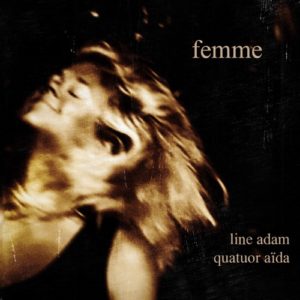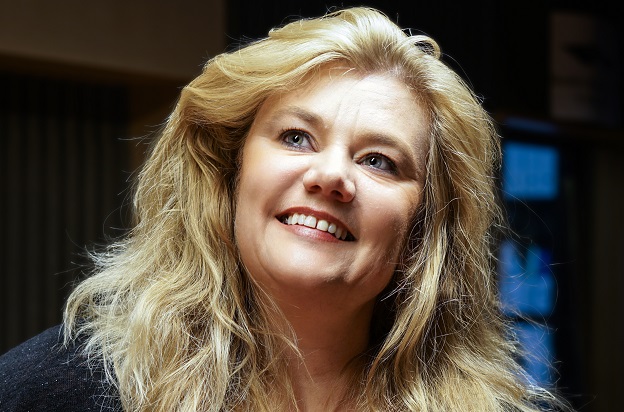Ms. Adam, your new album is entitled Femme. Femme, singular. What can you say about this project?
Femme, la femme! Since we’re talking about the man in the singular. It’s not a musical report on women but a sharing of the emotions of THE woman. I’m not a feminist at all. My approach is more like a mirror. I’m a woman and I’m halfway through my life. So I needed to take a look inside myself, at what I’ve become. We’re used to looking at what we’ve done, looking at what we could do, and sometimes we forget to look inside ourselves. As a woman, what do I experience and feel? Then, what do women ultimately feel overall? I think all humans are the same, but we have this thing that men don’t have yet, which is childbirth and pregnancy. That gives us a few more hormonal and emotional passages. (laughing)
For this project, you have chosen the string quartet, accompanied in some pieces by a saxophone and a piano.
I am particularly fond of strings. I also love string ensembles. At the beginning I thought I was only going to write for a quartet composed of four women, but as I progressed I found that men also had a big place in a women’s album because what would we be without them? So the saxophone and the piano are played by men. It’s a way of sharing life and I chose two men whom I musically like very much. I chose the humans before I chose the instrument!
 As on your CD Sculptures, you work here with a female quartet. Is that a coincidence?
As on your CD Sculptures, you work here with a female quartet. Is that a coincidence?
A coincidence, yes! I was looking for a female quartet for this project, which was not the case for Sculptures! At the time I wanted to work with the Thai Quartet, which unfortunately no longer exists.
Speaking about the woman in the music, is there a theme that preoccupies you?
When it comes to characters like Dido, Fidelio, Salome, Lulu, shouldn’t this question be answered by men? (laughing) Clara Schumann, Louise Farrenc, Lili Boulanger, for me, women composers have always followed their times, their desires, their instinctive creativity as well. The way of disseminating it must have been more complex than it is today. To the point of sometimes taking other first names, male first names, but a woman who composes is a human being who composes.
Your program Femme shows, that you’re a composer who likes to mix different genres of music.
That’s a great debate! Yes, I like a lot of things, but not everything, far from it. I’ve got a bit of jazz and world music influences, but I don’t think I’ve got too many influences on this album at the same time. I’d rather say several classical influences ranging from Gustav Mahler to Maurice Ravel or Dimitri Shostakovich, three composers that I listened to a lot. I regret that one always has to put a label on people. A style? My style? Perhaps that of bringing together 2000 styles, I don’t know. I’m influenced, yes, and there are only 12 notes in a scale, so even if mathematically the harmonic and rhythmic possibilities are enormous, you fall back into patterns when you write. My music moreover is rather tonal. I compare my writing to painting. Sometimes I like to paint fruits, a church, a landscape. This has been done since the dawn of time, but each composer painting a fruit will do it with his personal touch, even if you recognize the fruit. I am far from being a figurative painter, but rather an abstract painter! That’s my label if I had to put one on.
If you look at your own musical development, what could you say about your evolution as a composer?
It’s complex to talk about yourself. I don’t have the necessary retrospection I think. I hear around me that my compositions are becoming more and more recognisable, that I have a ‘style’ but again, what does that mean? What I would say, experienced from the inside, is that I am less in question when I write, my musical discourse comes out on its own, I no longer question what I should or shouldn’t write. That’s my evolution, I write because I need to write and it doesn’t matter what it becomes afterwards. Right now I’m writing a Stabat mater. That’s what containment has dictated to me. The form and instrumentation were immediately obvious. Later on, will it be performed? Recorded? Anyway, uh…
What is contemporary music to you and do you see yourself as a contemporary composer in the sense that this definition is used in the musical world?
This question comes up regularly and tortures me a little (laughing). The definition says this: « Contemporary music represents the various streams of scholarly music that emerged after the end of World War II. Some of these currents have taken new paths outside the tonal system. » So my answer is rather ‘No’. I’m very often in a tonal context, so I’m not a contemporary composer. But contemporary also means today. I’m thinking of composers like Arvo Pärt or Philippe Glass who are more in the movement of minimalist music, I’m probably closer to them.
I write music that speaks, that has emotions that the lambda citizen can understand. I’m not looking for sound or atmosphere. I find it very interesting and I listen to it regularly (especially at night) but it only remains ‘interesting’. I am not touched by contemporary music. I need to laugh or cry while listening to music and so I inevitably write that the one I have to create.


















